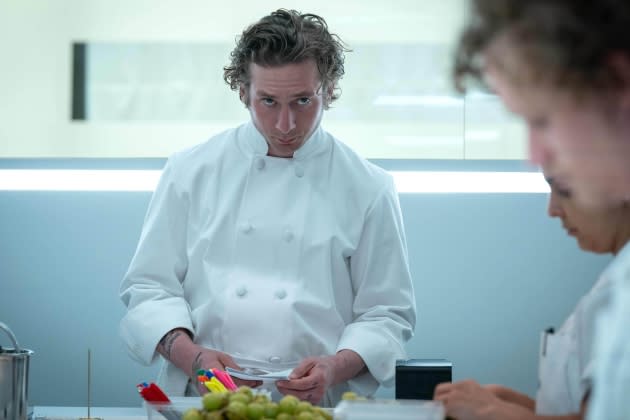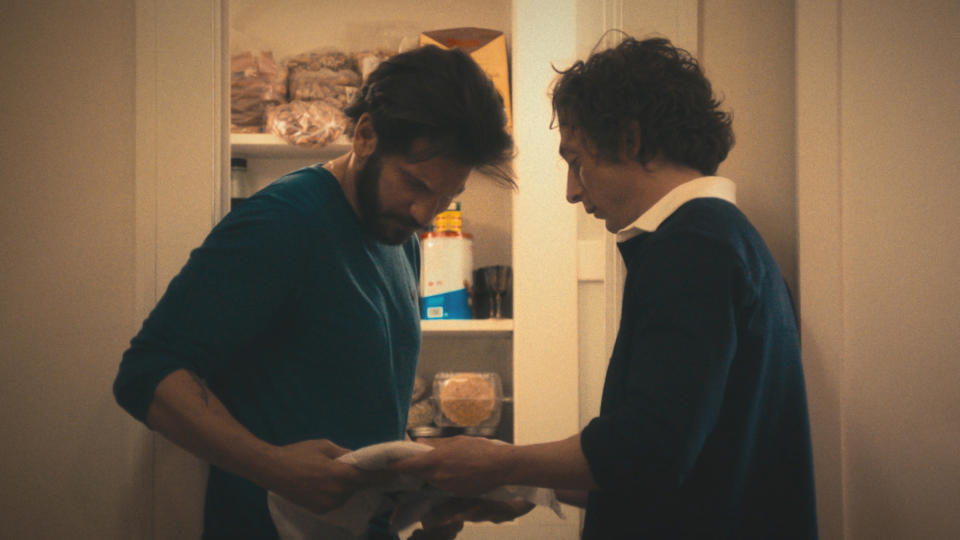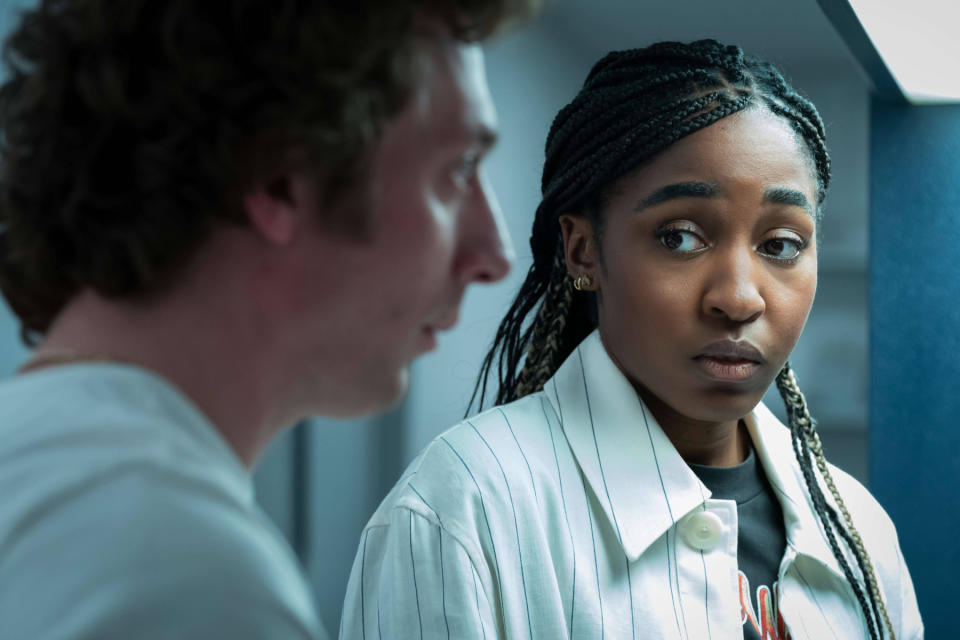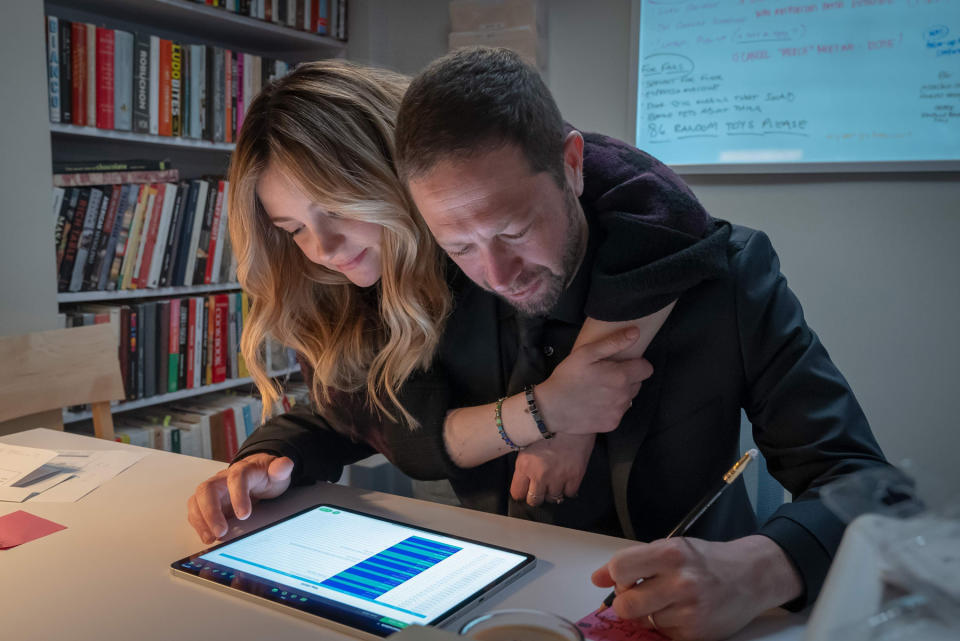Inside ‘The Bear’ Season 2: Damaged Souls, A-List Cameos, and That Finale
- Oops!Something went wrong.Please try again later.
- Oops!Something went wrong.Please try again later.
- Oops!Something went wrong.Please try again later.

This post contains spoilers for Season Two of The Bear, which is now streaming on Hulu.
Late in the finale of this extraordinary season of The Bear, Sydney (Ayo Edebiri) runs out to the alley behind the FX dramedy’s eponymous restaurant to puke. She still has PTSD from the incident in Season One where she didn’t put necessary limits on a new online ordering system, and it comes roaring back due to the stressful nature of The Bear’s unofficial opening for friends and family. But by the time her concerned father comes out to check on her, the vomiting has ceased being about the sound of the printer spitting out one order ticket after another. Instead, it’s just Sydney’s way of releasing all the anxiety she feels every day, and particularly on a huge day like this. She turns to her dad, gives him a thumbs up and a sincere, broad smile, before turning around to heave some more. Even he accepts that his daughter is just fine, and tells her, “Baby, it’s the thing,” as a way of apologizing for an earlier conversation where he suggested that she could find other, less risky things to put her heart and soul into.
More from Rolling Stone
Fans at Kanye's Sold Out 'Vultures' Premiere Still Want to Believe
'SNL': Ayo Edebiri Apologizes for 'Stupid' Jennifer Lopez Comments During Monologue
'SNL' Platforms Nikki Haley in a Big Way and Jokes About Her Civil War Denialism
This scene is The Bear Season Two in a nutshell: emotionally overwhelming but also funny, acknowledging the pain and fear and stress that comes part and parcel with this world, while also recognizing how rewarding it can feel when things work out. It would be by far the best moment in a season of most other shows; in this one, it’s competing with dozens of others for that title.
At first, the finale (also titled “The Bear,” for added confusion) is structured like that online ordering episode last year. Creator/writer/director Christopher Storer presents the first 10 minutes or so as an unbroken take, as we follow characters in and around the restaurant’s new kitchen and dining room as the soft opening becomes harder than anyone wanted. But rather than continue the stunt for the whole thing, Storer and his team switch to regular editing right at the moment when things go from bad to worse: Carmy (Jeremy Allen White) gets trapped in the walk-in fridge, because he kept forgetting to have the door handle fixed. The scene in no way loses its intensity from the shift; if anything, it feels even more frantic because we’re cutting directly from person to person, crisis to crisis, rather than having to find excuses to keep sliding past various kitchen stations.
But we should have already known that from the season’s sixth episode, titled “Fishes,” which is also edited conventionally, rather than as a single long take. A Very Special Guest Star extravaganza set five years in the past, it’s as stressful as anything the show has ever done. It’s Christmastime at the Berzatto house. Carmy is visiting from Copenhagen to see Mikey (Jon Bernthal), Natalie (Abby Elliott), and their mother Donna (played by Oscar winner Jamie Lee Curtis). Donna’s busy preparing the traditional Feast of the Seven Fishes, and as we watch her struggle to maintain control of the kitchen as various friends and family come in and out, we can see how Carmy so easily accepts the chaos he finds in every professional kitchen. This is all he knows, and all he has ever known. And in getting extended glimpses of both Donna and Mikey(*), we gain a much deeper understanding of how Carmy became such a guarded, anhedonic adult. He grew up around the extremes in Donna’s mood and behavior, around his mother and brother’s heavy drinking (and possible mental illness for one or both), and it’s no wonder he has closed himself off emotionally to this degree. Late in the season, he admits to Claire that he’s waiting for the other shoe to drop, and it’s hard to blame a guy whose life has conditioned him to expect disaster at every turn. He doesn’t want to open himself up to feel pain, even though he inevitably keeps doing exactly that throughout the season.

(*) As was the case last season, the series gets everything it possibly can out of Jon Bernthal’s limited screen time. The moment where Mikey studies the gift Carmy made for him, looking utterly lost and hopeless and sad, despite his palpable love for his little brother, is just devastating, entirely because of how much Bernthal says with his expression even before Mikey starts tearing up.
There’s a risk that the sheer tonnage of recognizable faces in that episode — not just Curtis and Bernthal, plus recurring player Oliver Platt (as wealthy Uncle Jimmy Cicero), but Bob Odenkirk (as friend of the family “Uncle” Lee), Sarah Paulson (as cousin Michelle), John Mulaney (as Michelle’s partner Stevie), and Gillian Jacobs (as Richie’s pregnant, soon-to-be-ex-wife Tiffany) — could distract from the family drama raging within it. But the casting feels essential, rather than like a stunt, because we are meant to be thrown into the extended family deep end. The familiarity works as necessary shorthand to understanding the dynamics — say, that Lee is a blowhard whom Mikey resents as an interloper, or that Stevie doesn’t quite feel like part of the family, even though he appreciates being so often welcomed in by them — so we can just marinate in the rising tensions as we wait to see just how badly this dinner is so obviously going to end.
The answer: very badly, even by The Bear standards. Mikey’s dislike of Lee becomes physical as he begins flinging forks at him, then threatens to outright fight him. The camera films Bernthal and Odenkirk in such tight closeups that they start living up to Lee’s description of Mikey as an animal. Stevie’s lovely speech about feeling welcomed by the family — and about how bears are actually very kind and sensitive, despite their reputation — briefly seems to be cooling things down. But then Natalie makes the mistake — which her brothers warned her not to earlier in the evening — of asking a weeping Donna if she’s OK, which triggers every last alarm and defense mechanism in her mother’s fragile psyche. Donna screams and curses at the entire table, storms out, and then drives her car straight into the living room. Is it a poorly thought-out attempt at the suicide she threatened earlier in the episode? An extreme way to manifest the rage that’s always lurking right below her tightly-wound surface? Both? Whatever percentage you want to assign, it’s a nightmare for the extended family, and particularly for the three siblings. This show is primarily Carmy’s story, but those final moments are punctuated by one sound and one sight: respectively, Mikey screaming at Donna to open the car door, and Natalie struggling to compose herself. This happened to all of them, and the ripple effects are still being felt by the survivors.
Donna appears briefly in the finale, standing outside The Bear for the soft opening, but too afraid to go in and ruin everything(*). So there is no literal car crash on this night. But Carmy causes a couple of metaphorical wrecks. His absent-mindedness about the walk-in door makes life infinitely more difficult for everyone else during the opening, and leaves Carmy trapped with nothing but regret, fear, and roiling anger while Sydney, Richie (Ebon Moss-Bachrach), Tina (Liza Colón-Zayas), and Marcus (Lionel Boyce) have to get by without him. And while he’s trapped in this cage of his own making, he begins venting about how this is his fault for getting involved with old flame Claire (Molly Gordon), making him too distracted to do his job at the level of detail he owes to Sydney and the others(**). Even before we see that Claire is on the other side of the locked door, it’s obvious that she’s there, because how else could this lousy night end for Carmy, other than with him blowing up the one part of his life that allowed him to feel peaceful and content?
(*) The season as a whole does a remarkable job of giving every minor character at least one moment to shine. A great example of that approach happens here, as Natalie’s husband Pete — earnest, eager-to-please, perpetually baffled by the hot-tempered family he for some reason married into — tries desperately to convince his mother-in-law to come inside. He is at once confused by her reluctance, hurt on behalf of his wife, and oblivious to the notion that Donna is probably right about what would happen if she were to enter the establishment. That scene, and a later one where Pete breaks down because he has to keep this secret from Natalie, are excellently played by Chris Witaske, and give enormous humanity to a figure who’s around so rarely and briefly that it’s usually easy to forget he’s on the show at all.

(**) The writers, Ayo Edebiri, and Jeremy Allen White nimbly walk the line of showing how deeply Sydney and Carmy care about each other, but in a professional/platonic way. Every time she looks disappointed when he talks about Claire, it’s not romantic jealousy, but frustration that he’s not giving this thing as much time and mental energy as she is. She loves that he believes in her, and resents him when he leaves her to shoulder too much of the load.
The accidental breakup would feel like more of a tragedy if Claire wasn’t such a thin character. (Molly Gordon does what she can in the role, but Claire is defined almost entirely by how Carmy feels about her.) But it still hits hard because of what it means for our lead. This should be a triumphant night for him. Despite all the calamities, including the walk-in door, the soft opening goes incredibly well for the guests. Uncle Jimmy and Sydney’s dad are both genuinely moved by the food and the service. Everyone is having a great time, and are largely oblivious to what’s happening in the kitchen. It is not a Michelin star-level operation yet, or even close to that, but this kind of rehearsal is there to work out these kinks. (It’s helpful, for instance, that Marcus discovers one of the new line cooks is a drug addict on a night like this, rather than one open to the general public and reviewers.) Richie saves the day in Carmy’s absence (more on him in a bit, but I hope you noticed that he wears suits now), and far more good happens than bad. And on top of that, Carmy does seem happy with Claire, even if other people like Jimmy have started to warn him that a relationship is incompatible with the kind of restaurant he wants to run. There is a world in which he could beat himself up for a night, then come back to work recharged, excited to take the next step and try a little while longer to make things work with her. Or, at least, there’s a world where he lets Claire down in a much more kind fashion, rather than letting her hear him vent, “No amount of good is worth how terrible this feels! It’s just a complete waste of fucking time!” Instead of cooling off, he drives a car right through the middle of their relationship, and now he has yet another thing to hate himself about. It’s rough.
After Claire leaves, the repair guy finally comes to free Carmy from his refrigerated prison. As Carmy flashes back on good times with Claire, we see sparks begin to float through the walk-in, a byproduct of the repairman’s power saw cutting through the door. It is a stunning shot, at once beautiful and sad, as if the sparks are fireworks celebrating a big event that has been utterly poisoned for Carmy.
The finale has other moments of joy laced with melancholy, like Marcus missing the messages from his mother’s nurse, presumably about her taking a turn for the worse. But despite the brutal climaxes of both “Fishes” and “The Bear,” the season is much more light than dark, while still providing the same immersive, empathetic experience that we got in the deliberately more difficult Season One.
For all that Carmy finds lacking in himself, so much of this year was about demonstrating the ways that he and/or Sydney have lifted up the people they care about. Natalie has an excuse to get out of the house and prove she could run the business, even while increasingly pregnant. Marcus gets that endearing interlude in Denmark(*), and when he tells Carmy that his new Copenhagen-inspired dessert would be called “The Michael,” you’d have to be made of stone to not get at least a little misty. (Things got considerably more than misty over here.) Tina gets to come into her own even more at culinary school(**), including that fantastic hero shot of her drawing Carmy’s kitchen knife for the first time, as if she were Ash admiring his chainsaw arm in Evil Dead 2. (She also gets to win over her much younger classmates with her karaoke skills.) Carmy abandoning Sydney to hang with Claire in the season’s third episode inspires Sydney to take a culinary tour of Chicago that’s so vivid, you can practically taste every amazing dish she tries.

(*) The beginning of Marcus’ trip is accompanied by Lindsay Buckingham’s “Holiday Road,” famously used in National Lampoon’s Vacation, another story of Chicagoans traveling (albeit less successfully than Marcus does). It’s one of a whole lot of delightful Eighties needle drops on this season’s soundtrack, like Bruce Hornsby’s “The Show Goes On” and The Replacements’ “Can’t Hardly Wait.”
(**) If there’s one story that felt slightly underserviced this year, it was change-averse Ebraheim skipping out on the same learning experience that Tina so heartily embraced. The show was tracking a lot of characters over the course of these 10 episodes, three of which (“Fishes,” “Forks,” and the Copenhagen-set “Honeydew”) are largely or entirely set away from the restaurant, so it’s impossible to properly service everyone. But Ebra’s belated reconciliation with Tina felt like it was missing a step in between him ghosting her and him returning to run the drive-through that will focus on sandwiches from the old menu.
And then there was Richie, who began the season complaining that he had no purpose, and ended it as The Bear’s nattily-attired savior. All this came about as a result of my personal favorite episode of the season, “Forks.” While the restaurant is still mid-renovation, Carmy sends Richie to spend a week as a short-term apprentice at what is described as “the best restaurant in the world.” At first, he is just tasked with polishing the forks, a job he half-asses because he thinks it’s beneath him. But as he spends more time at the place, he begins to drink the Kool-Aid just like his new mentor Garrett (Andrew Lopez) once did, recognizing that the ridiculous level of attention to even the smallest detail results in an operation that feels more like magic than commerce. As one of the other hosts (played by Sarah Ramos) explains, “Every night, you make somebody’s day.” It’s fascinating to see Richie fall in love with the place so quickly, yet still feel like Carmy sent him there to get rid of him for a while. But it speaks to Richie’s pathologically low self-esteem. And in an incredibly charming and relaxed scene to close the episode, the celebrated Chef Terry (Olivia Colman, used far better here than on her other streaming show this week) tells Richie, unprompted, that Carmy believes in him. “He said you’re good with people,” she adds. “He’s not wrong.” Between those words of encouragement and her “Every Second Counts” motto (inspired by her father), Richie returns to The Bear a changed man. He wears suits now. He knows how to manage. He has become a fiend for detail himself, rejecting a potential hostess because she didn’t recognize his Princess and the Pea-style gambit with a misaligned place setting. And when Carmy is out of action and Sydney is overwhelmed, it’s Richie who steps in to calm everyone down and get the dinner service back on track.
Earlier in the season, Richie keeps defending his more loutish behavior by saying, “I’m not like this because I’m in Van Halen. I’m in Van Halen because I’m like this.” It’s a paraphrase of an oft-quoted David Lee Roth line, and the question at the heart of it — Are damaged people damaged from nature, nurture, or both? — is one of the core ideas behind The Bear. All three Berzatto siblings grew up in the same house, with the same mother, and all at one point or another wound up working in the family business. Yet they couldn’t be more different in temperament, worldview, or flaws. Richie was Mikey’s best friend, and seemed destined to be left behind in a world without his beloved “cousin.” Yet he is able to turn himself into a person who fits into Carmy and Sydney’s culture far more seamlessly than he ever did when this was The Original Beef of Chicagoland. There is some level of dramatic license required to transform Richie so much after just one week. But “Forks” casts such a potent spell over both Richie and the viewer that it’s hard to begrudge him for wanting to help Carmy and Sydney turn The Bear into a place that can provide its guests with a similar feeling.
The Bear is obviously not there yet. The restaurant, anyway. The show with the same name is already at a level of artistry few of its competitors can touch. It continues to make every second count.
Thanks, Chef!
Best of Rolling Stone

